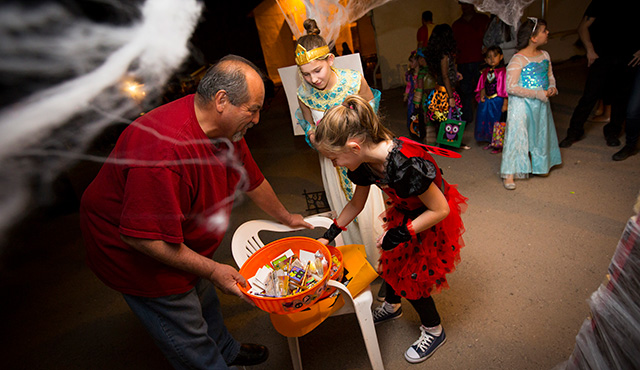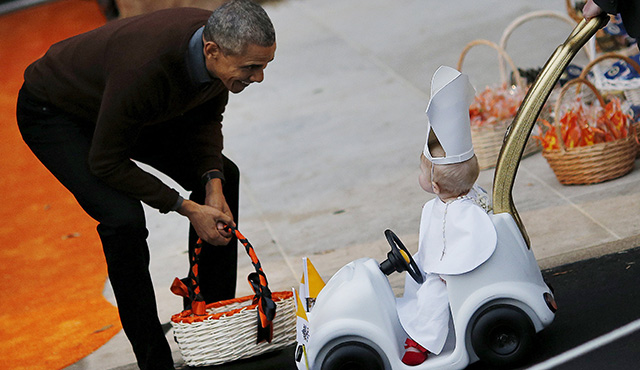Far from sympathy for the devil, Halloween is a hodge-podge of Catholic devotion, Protestant hostility and a Papal decree. All Hallows Eve is a windup to the bigger celebrations of All Saints day and All Souls day. In fact, Halloween marks a church-approved opportunity to thumb your nose at the devil and let him know you’re not afraid of a bully. Contrary to popular fiction, it’s not a “Christianization” of Druid or pagan beliefs, nor is it rooted in witchcraft.
According to the article Why Catholics Should Embrace Halloween on the Catholic Answers website (catholic.com), “Dressing children in ‘scary’ costumes for the amusement of the neighbors can defang evil by demonstrating that innocence is adorable and evil is but a damned parasite on all that is good and noble. But in a hyper-scrupulous environment, it can be difficult for Christians to appreciate that there is spiritual value in such mockery of evil – or even that it is mockery of evil and not participation in it.” It diffuses the unhealthy fear of the devil; forgetting that Jesus conquered Satan, from a healthy fear of the great deceiver.
Watching late-night entertainment, we see first-hand how the power of mockery can undermine or diffuse the influence of the unfortunate person being mocked. Once someone or something has been shown to be a fool, it’s hard to take them seriously. In a sense, Halloween is a Christian version of “Jimmy Kimmel” with the devil as a target.
Halloween is a peculiarly American phenomenon but its roots trace back to fifth-century Rome. On May 13, 610 A.D, long after the Druids were largely converted, Pope Boniface IV dedicated the Roman Pantheon to the Virgin Mary and all Christian martyrs. This was the first time a Roman pagan temple was consecrated as a Christian place of worship and the date was set aside to honor the martyrs. Marking a major milestone in Roman/Christian history, along with the dedication, cartloads of bones from martyrs buried in the catacombs were reburied under the altar. May 13 also coincided with Lemuria, a pagan Roman celebration to satiate the restless dead.
Catholic Answers explains: “A century later, this day of All Saints was moved to Nov. 1, ‘All Hallows,’ ‘Hallowmas,’ ‘Hallowtide’ and ‘Halloween’ eventually joined the stable of popular designations for the time in the Church’s liturgical calendar when the Church commemorates its saints (or hallowed ones).”
Most cultures have some sort of harvest festival, but it doesn’t mean that they are directly connected to All Hallows Eve. Catholic Answers suggests: “Christians were not forbidden to build bonfires during the autumn months, or to carve gourds into lanterns or to set out treats for the dearly departed. Realizing the missionary value of incorporating non-evil pagan folk practices into Christian customs, the Church allowed Christians to continue these old customs, seeing in them ways to pass on the faith. If all this festivity and seasonal reflection got Christians to go to Mass for the feasts of All Saints and All Souls and reminded them to set aside time to pray for their beloved dead, why raise hell over the idea that pagan ancestors may have done similar deeds for not altogether dissimilar reasons?”
Traditions and practices were tacked on until Nov. 5, 1605. Catholic convert Guy Fawkes hatched an ill-advised plan to blow up England’s protestant King James I and Parliament. Hawkes was hanged and the day became a cause for celebration. This tradition came to America shortly thereafter with the arrival of the first Puritans. As immigrants poured into the new world, they brought their seasonal traditions with them, which were incorporated into the Halloween stew. Witches invited themselves to the party late in the game.
According to Father Augustine Thompson, O.P. associate professor of religious studies at the University of Virginia, “The greeting card industry added them (witches) in the late 1800s. Halloween is already ‘ghoulish’ so why not give witches a place on the greeting cards? The next time someone claims that Halloween is a cruel trick to lure your children into devil worship, I suggest you tell them the real origin of All Hallows Eve and invite them to discover its Christian significance, along with the two greater and more important Catholic festivals that follow it.”
Remembering, and more importantly, praying for our departed friends and loved ones underscores our faith in eternal life. This alone is cause for celebration. Now that the shadow of paganism is lifted, Catholic children and their parents can join in the fun of Halloween once more, as long as you can still get up for Mass the next morning.


